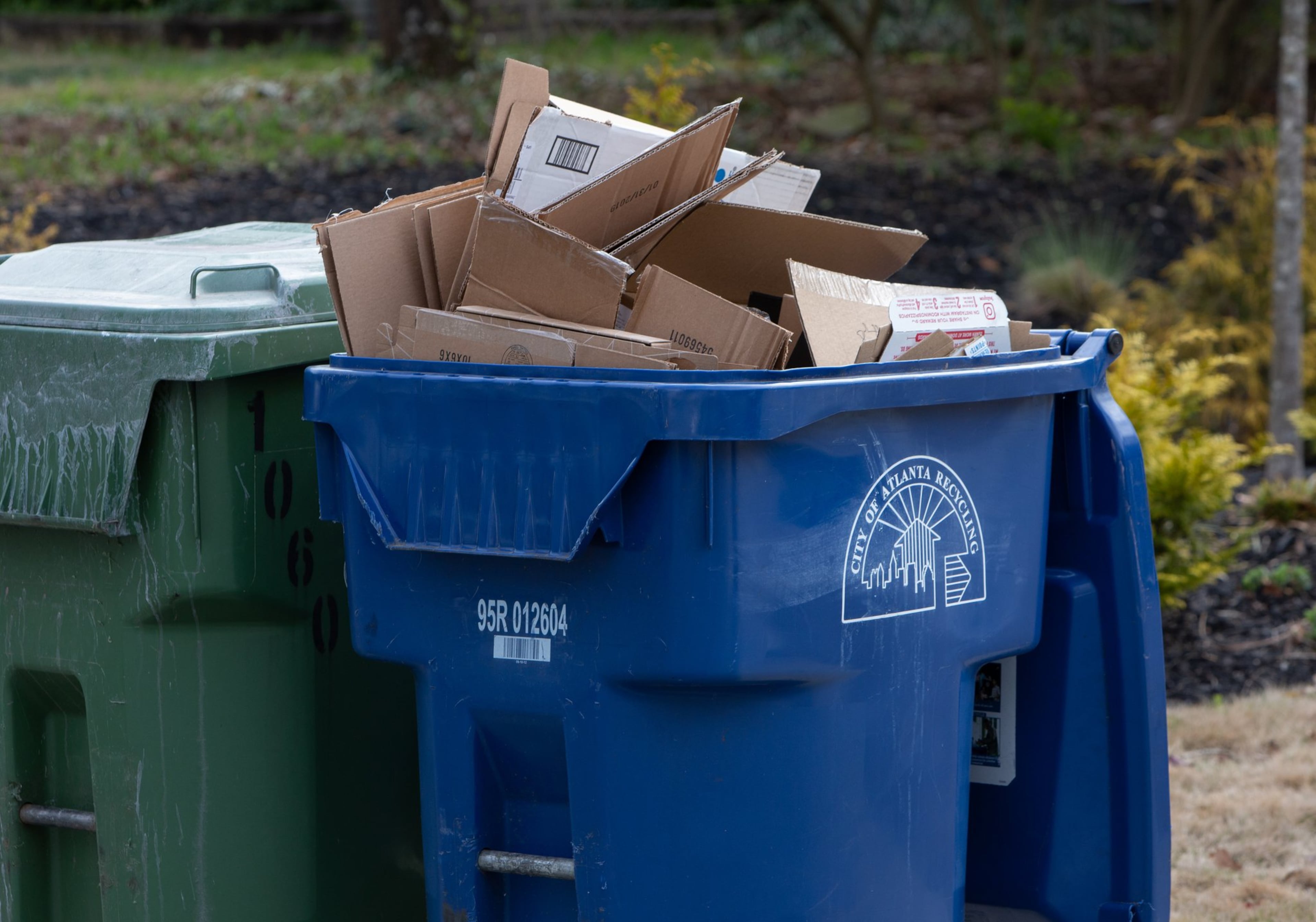Atlanta has seen growth in recycling. An audit shows room for improvement.

Recycling rates in Atlanta have improved over the years. But an audit of the city’s program finds that a greater proportion of residents send waste to landfills than the national average and an education campaign and enforcement of rules for apartment communities could keep more reusable material from ending up in the dump.
The city’s Department of Public Works picks up trash and yard waste and offers curbside recycling of paper, plastic, metals and glass. Recycling participation citywide is about 23% — up from 11% in 2017, according to the audit. That lags behind the 32% nationwide rate, according to the Environmental Protection Agency.
One of the biggest areas of improvement for the city could be in creating an education campaign to get more residents engaged and decrease the amount of contaminated recycling in the city, which is currently about 20%, said the audit, which was first reported by Axios.
The 33-page report also provided recommendations for improving the city’s recycling data and tracking, establishing a waste diversion goal, improving recycling rates, enforcing the city’s multifamily recycling ordinance and assessing options for glass recycling. The goal of the audit was to “assess the effectiveness of the city’s recycling program in diverting waste and identify barriers to participation.”
Experts say recycling is key to keeping reusable materials out of landfills and waterways. Additionally, reusing materials reduces production of greenhouse gases, a key driver of global warming.
The state of recycling in Atlanta
As part of its curbside collections service, Atlanta collects recyclables weekly.
From September 2024 through January 2025, the city’s recycling tonnage totaled 6,610, compared to garbage tonnage of 22,565, a recycling rate of about 23%.

Since beginning to focus on initiatives to increase recycling in 2017, the city has seen rates more than double. Participation, however, is not consistent across the city.
Even the area with the highest participation, Service Area 5 — which includes Buckhead and north Atlanta — recycles about a quarter of its waste, still lagging behind the national rate. Other areas of Atlanta range from 15-21%, according to the report, with the southwest and west parts of the city trailing the most.
Atlanta’s recycling is single-stream, which means recyclables can all be put in one bin, as opposed to separated by type. Uniquely for the metro area, Atlanta accepts glass in its recycling program. Glass recyclables are sent to a separate facility after collection.
While this diverts waste from landfills, glass is more expensive to process. The report encouraged the city to consider the economic feasibility of this service whenever they next update their waste management plan.
All single-family residence owners — including residential units in a condominium project, duplex, triplex, townhouse or apartment building — are charged recycling fees, regardless of whether they actually use the program. Education about this fact, as well as the benefits of recycling, may encourage increased participation, the audit said.
How to improve recycling rates
In addition to implementing educational efforts, another key area of improvement that would help direct the program and increase effectiveness, according to the report, would be to adopt a specific waste diversion goal for curbside collection. This is something the city has yet to do.
The audit highlighted some major issues with data collection, management and consistency. The department’s tracking system — Rubicon — had tonnage inaccuracies, and mismatches between invoices and tonnage records led to overpayments to Pratt Industries, with which the city partners.
Tracking one week in December 2024 showed a discrepancy of Rubicon noting 54 fewer tons than tickets collected along pickup routes.
As such, the audit recommended developing procedures for recording data, quality control around maintaining data accuracy and a reconciliation process for matching data and invoices.
Maintaining accurate data will not only help remediate overpayment issues, but will also enable tracking toward achieving a waste diversion goal, should the city set one, and developing a more comprehensive understanding of citywide participation.

Another key issue is the city’s enforcement of the multifamily recycling ordinance requiring property owners of six or more units of multifamily dwellings to provide tenants with recycling services and to annually report recycling tonnage to the city.
According to the audit, neither the Department of Public Works nor the Mayor’s Office of Sustainability and Resilience is monitoring property owners’ required recycling tonnage reports. The reporting portal is linked to an unmonitored email with “vague” autoreplies, the report said. “Department [of Public Works] leadership agreed that an enforcement plan is needed but noted that enforcing the ordinance will require additional funding, staffing, and collaboration with other city departments,” it added.
As remedy, the audit recommended assigning a monitor to the portal, report confirmation receipts and periodic inspections to ensure property owners are obeying the ordinance.
In its response to the audit, the Department of Public Works agreed with all of the proposals, labeling all of them as started and aiming to implement them by the end of this year.
The Department of Public Works and the city of Atlanta Office of Communications did not respond to requests for comment from The Atlanta Journal-Constitution.


